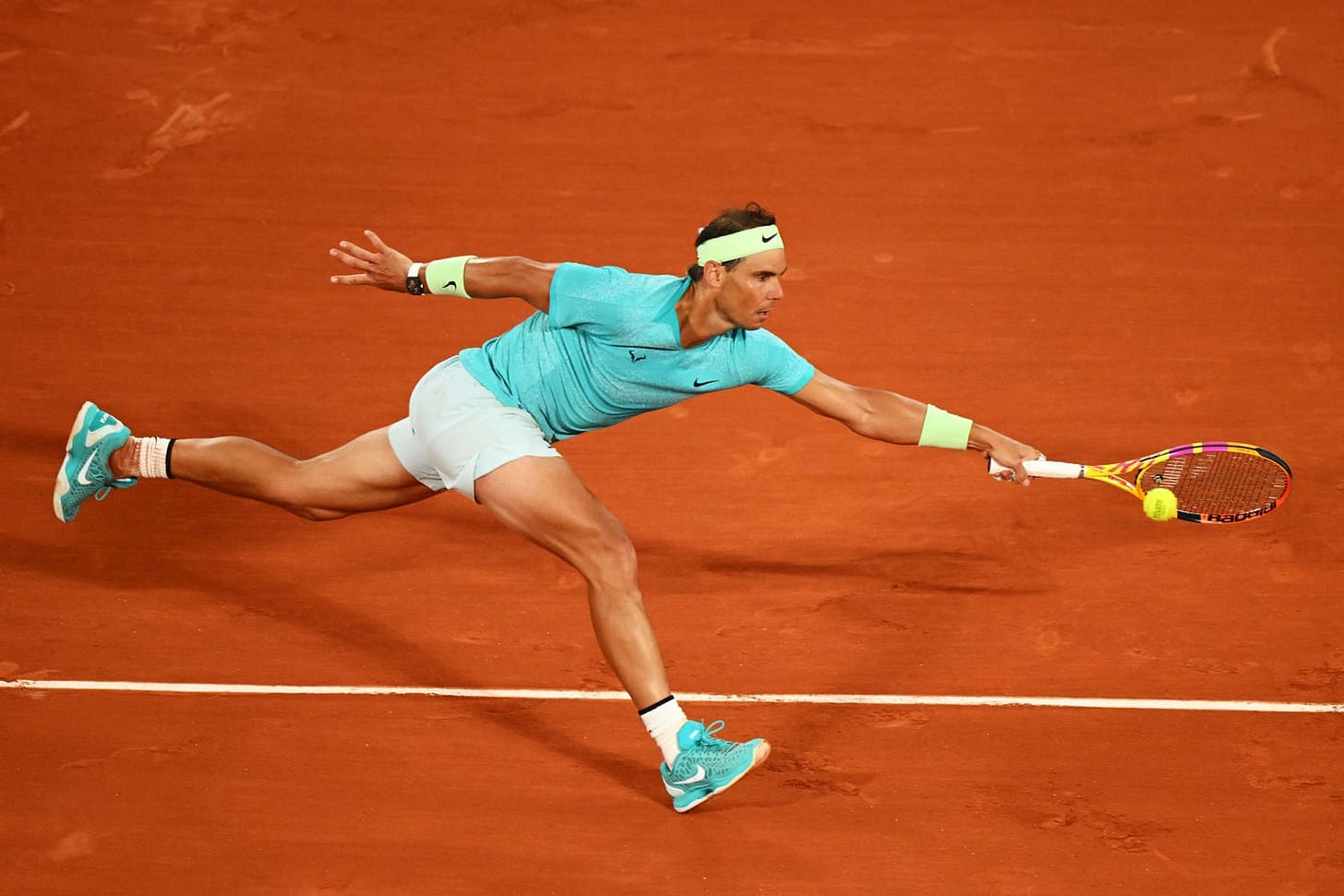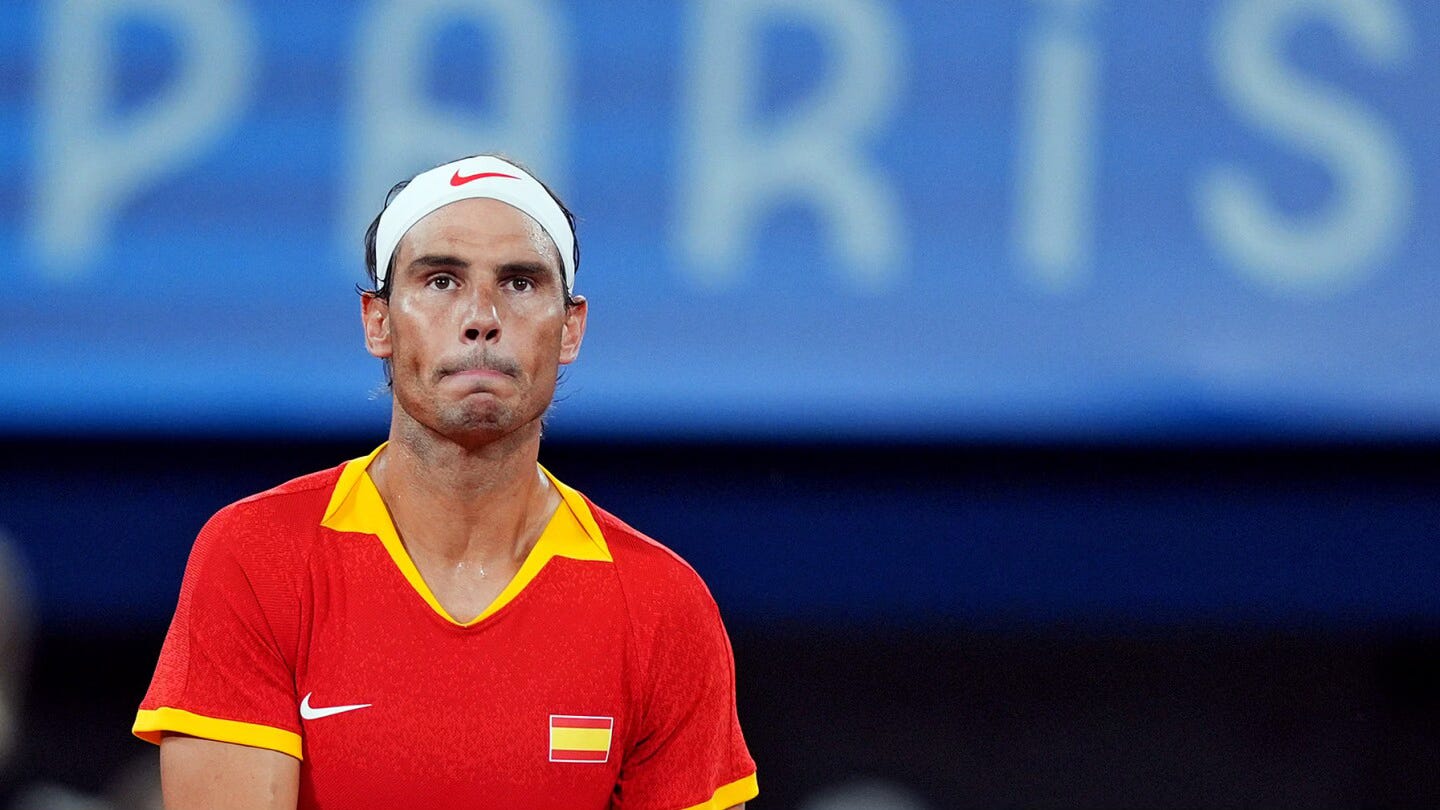The wisdom of Rafael Nadal
How to embrace suffering
Yesterday, Rafael Nadal competed in his final match as a professional tennis player during the Davis Cup. His achievements are remarkable: he spent 209 weeks ranked No. 1 and seized 92 singles titles, including an Olympic gold medal (and another in doubles). He won 22 Grand Slam tournaments, second only to Novak Djokovic, who holds 24. Even more astonishing, he claimed 14 French Opens, establishing himself as the greatest clay-court player ever.
Yet these statistics are only part of Nadal’s legacy. The values he exemplified on and off the court may hold even greater significance than his wins. Nadal is regarded as one of tennis's toughest competitors, a dogged warrior who played each point as if it were his last. What is less often recognized, though, is that his fighting spirit stems more from wisdom than sheer ambition. Beneath the relentless drive lies a deep understanding of how to face adversity and a nuanced philosophic view of victory and defeat. Nadal’s tennis is a powerful expression of a belief system with value beyond sports.
Nadal has always said that his priority in every match is to play with the right mindset and do everything he can to win. His satisfaction comes more from the certainty that he gave his all than from the final score. He expresses this after excruciating defeats and hard-fought victories, which explains why he never gets overly elated when he wins or deeply disheartened when he loses. American tennis legend Chris Evert says Nadal embodies Rudyard Kipling’s famous passage from the poem If —inscribed above the entrance to Wimbledon’s Centre Court: “If you can meet with Triumph and Disaster and treat those two impostors both the same.”
In the second half of the 2018 season, Nadal showcased this wise approach to competition in a series of matches. At Wimbledon that year, he won a roller-coaster quarterfinal against Juan Martín del Potro, only to lose the semifinal to Djokovic in another five-set thriller. Although the defeat against his longtime rival had to be painful, he wasn’t hard on himself after the bout: “In my opinion, he [Djokovic] deserves it. I deserve it, too…As I said the other day against Del Potro, anyone could win…The other day was for me, today was for him.”
A few months later, at the U.S. Open, Nadal beat Dominic Thiem in another epic battle that ended in a fifth-set tiebreak. The Spaniard conveyed something almost identical in victory to what he had said in defeat. In the press conference, he reminded the media that, at Wimbledon, he had lost a match that was as closely contested as the one he had just won. He reflected that, while things went his way against Thiem, he was equally satisfied with both performances. In each instance, he had played at a high level and fought as hard as he could.
As in many sports, the outcome of a tennis match can hinge on small things —a net cord, a few balls barely clipping the line, the sun's blinding glare forcing an error at the worst moment. Just as in life, you can lose a game even if you played better than your opponent. Nadal knows that the margin between victory and defeat can be so narrow that it often comes down to factors you have little control over. What you can always control, however, is the preparation for matches, the daily effort to improve, and your attitude when you compete —striving to perform at your best at every turn.
This outlook is intertwined with another key tenet of the Spaniard’s philosophy: embracing hardship. Nadal says he enjoys the suffering when he faces a troublesome opponent. What does he mean by this? The Spanish novelist Javier Cercas suggests that while anyone can appreciate pleasant moments, Nadal enjoys himself even in discomfort —not because he likes the suffering itself, but because he can find joy in any situation. This reflects a love for life, Cercas writes.
My interpretation is slightly different: Nadal simply relishes the struggle to overcome a difficult challenge. The tougher his rival, the more focused he becomes. The effort to win, especially when victory doesn’t come easily, serves as a way to dissolve the world around you and, like a Buddhist monk, direct your attention fully to the present moment. As a writer, I’ve learned that few mental states are more enjoyable than losing yourself in a demanding task. But I also understand Nadal’s choice of words. When you’re in that zone, the line between pleasure and suffering blurs.
Nadal teaches us a powerful way to reframe our attitude toward adversity. When the score in a match turns into an uphill battle, some respond by convincing themselves they aren’t playing well that day or the opponent is just too strong, unconsciously creating an excuse for not giving their best. In contrast, Nadal focuses on pushing himself to raise his level, turning obstacles into fuel. As tennis coach Patrick Mouratouglou has said, Nadal transforms his fear of losing into a superpower.
This deep belief that there is always some space, however small, to overcome a tough challenge combines with a realistic assessment of his abilities. Nadal is not prone to self-delusion. He has said that frustration often comes from failing to admit you’re still not good enough and that mental strength is sometimes overvalued: “What makes you win, normally, is striking the ball well.”
In a 2019 battle against Daniil Medvedev, Nadal staged a comeback after trailing 5-1 in the deciding set. After the match, he resisted reporters’ attempts to exaggerate the magnitude of his feat or give him too much credit for the victory. He knew he had been lucky, emphasizing that such comebacks against top players like Medvedev are extremely rare (“one out of 1,000”). He knew his chances of winning were slim, no matter what he did. But he also recognized they would be even slimmer without the right attitude. The lesson, he said, is to stay positive and not break the racquet when you are down 5-1. If your chances of winning are 10%, they drop to zero if you act as they’re zero.
Over the past decade, I’ve followed the so-called Big Three of tennis —Roger Federer, Nadal, and Djokovic— as they competed for the record of Grand Slams, rooting for Nadal to come out on top. Watching Djokovic close in on his two rivals and eventually take the lead was often painful —enough to make me wonder if I’d become one of those obsessive sports fans I used to frown upon. Now, though, I think it’s fitting that Djokovic ended up winning that race. It reinforces Nadal’s lesson: do your part without fixating on those two impostors of Kipling’s poem.




Nice text, superbly written.
However, I'm more of a Federer fan (tú eres Cronopio, yo soy Fama). I'm not that big of a tennis head, but my view is like Foster Wallace's: Nadal embodies force and testosterone, Federer is grace, technique and style.
Be that as it may - and taste is whatever - I lost all respect I had for Nadal at the end of his career when he signed that lucrative, multimillion dollar deal with the Saudis to help them green-wash their horrors. All this for... Money?!? Wtf? My French friends who were huge Nadal-heads disavowed him after this and pretty much hate him, now.
Can't say I blame them, although I don't care enough about tennis for this to be an issue.